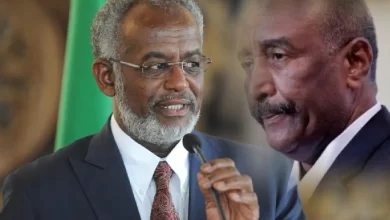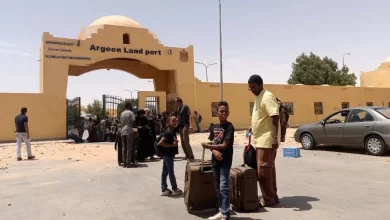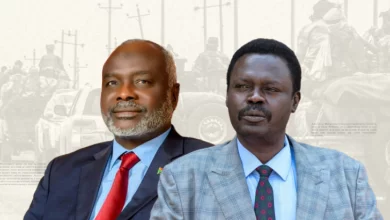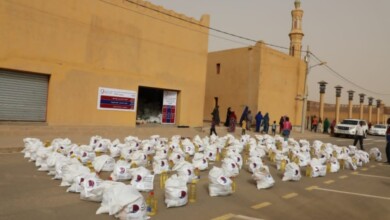Why does SAF insist on using hunger as a weapon?
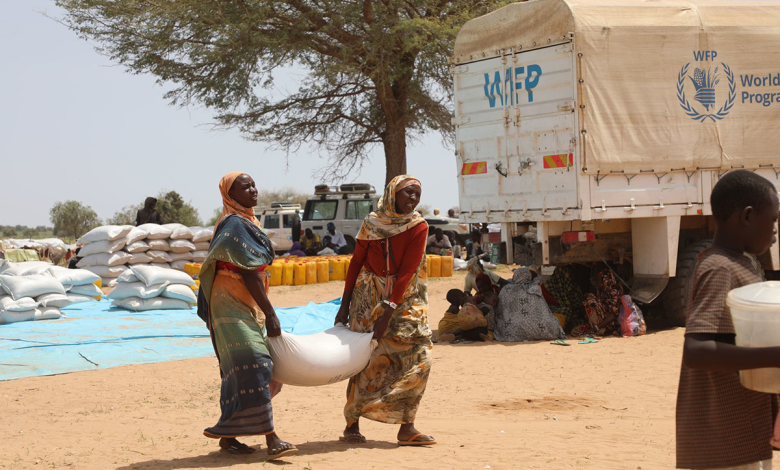
Activists are expressing their dissatisfaction with the international stance that fails to exert enough pressure at a time when the Sudanese Army is still obstructing the delivery of humanitarian aid to those affected by the conflict between it and the Rapid Support Forces, despite international appeals and the promises previously made by the government loyal to the Army, that is utilizing Port Sudan, east of the country as its base.
The Army refuses to allow the flow of aid, whether by procrastinating in granting permits to those supervising the process (representatives of the World Food Programme), which was previously revealed by an investigation by (Reuters); or by cutting off supply lines, or going as far as to impose restrictions on border crossings.
The Army’s position, according to activists, reflects a mockery of international laws and norms, as well as a lack of concern for the suffering of civilians, who have been ravaged by a deadly war for more than a year and a half.
Sudanese activists state that the Army is using hunger as a weapon to pressure the social incubators of the Rapid Support Forces, as well as the areas that the (RSF) has controlled since the outbreak of the conflict, in hopes of inciting the population against them.
Activists are expressing their dissatisfaction with the international position, that fails to exert sufficient pressure on both parties to the conflict, in addition to failing to call things as they are, even though the international community realizes that the Army is responsible for the difficulty in delivering relief supplies to the areas affected by the war.
On Monday, the UN Secretary-General António Guterres stated that the Sudanese people are facing a deteriorating state of suffering on a daily basis, and are living a “nightmare” of hunger, disease and “serious ethnic violence,” especially in Darfur. Guterres added before the Security Council that with the death of thousands of civilians, “widespread” rape and other “unspeakable atrocities,” “the Sudanese people are living a nightmare of violence,” expressing his feeling of “horror” regarding the attacks launched by both parties to the conflict.
Under pressure, the government loyal to the Army agreed in mid-August to use the Adre border crossing with Chad to bring humanitarian aid into the Darfur region for a period of (3) months, but only a small amount of that aid has been allowed entry.
The deadline set by the government to deliver aid through the Adre crossing ends in mid-November, and it is not yet clear whether the Sudanese government intends to extend it, but observers are skeptical.
The Adre border crossing is considered one of the most prominent border crossings between Sudan and Chad in western Sudan. In addition to its proximity to the capital of West Darfur, El-Geneina (289 km), the crossing is of particular importance for delivering humanitarian aid to Darfur, as well as being a strategic corridor for border trade between the two countries. Its named after the Chadian city of Adre, which borders West Darfur state.
On Sunday, the Executive Director of the United Nations’ World Food Programme called on the warring parties in Sudan to grant full access to the country from various crossings in order to confront the threat of “looming famine.”
“We want full access, as well as the ability to enter through as many different entry points into Sudan as possible, and to make sure that we can begin implementation on a large scale,” stated Cindy McCain, Executive Director of the Programme.
The Army is using hunger as a weapon to pressure the social incubators of the Rapid Support Forces, as well as the areas controlled by the thses forces.
“Famine is looming now. There is a state of famine in Zamzam Camp and it will spread. Therefore, its necessary for us to be able to enter and do it on a large scale,” she continued.
A Reuters investigation last summer revealed the complicity of two Sudanese World Food Programme employees, who had ties to the military and played a role in concealing information, obstructing the delivery of aid, and sometimes causing aid to disappear.
Two sources familiar with the investigation stated that in one case in June (2024), the programme’s deputy director in Sudan concealed information from donors that military authorities in Port Sudan had refused to allow (15) trucks loaded with essential aid to head to Nyala in South Darfur, an area at risk of famine. The trucks waited for seven weeks before being allowed to move.
A war has been raging since April 2023 between the Sudanese Army led by Abdel Fattah al-Burhan and the Rapid Support Forces led by Mohamed Hamdan Daglo.
Approximately (11.3) million people have been displaced by the war, nearly (3) million of whom are outside Sudan, according to the United Nations High Commissioner for Refugees (UNHCR), which described the situation as a humanitarian “catastrophe.” Approximately (26) million people are facing severe food insecurity, and famine has been declared in (Zamzam) Camp in Darfur.
The Army’s position reflects a mockery of international laws and norms, as well as a lack of concern for the suffering of civilians. “It’s about getting food and trucks in there, so it’s important that the crossings remain open… as well as other crossings across Sudan from the border of South Sudan to the north. We need to open as many of them as possible,” McCain explained.
Last week, about ten countries, including the United Kingdom, United States, France and Germany, called on the warring parties in Sudan to ensure that humanitarian aid reaches the millions of people in need of “urgent assistance.” These countries shared in a joint statement that the systematic obstruction by both camps of local and international humanitarian efforts is “the root cause of this famine.”
“We are trying to make sure that we can feed people on a large scale in Sudan,” McCain, who stared she met with Al-Burhan, the Army Commander-in-Chief, stressed.
On Monday, the United Nations Office for the Coordination of Humanitarian Affairs (OCHA) reported that (47,000) people had been displaced from the eastern state of Al-Jazeera to the states of Kassala and Al-Qadarif due to the outbreak of armed violence that left dozens dead.
Guterres noted on Monday that there were calls from Sudanese and human rights groups for increased measures to protect civilians, including the possible deployment of a neutral force, saying the move reflected “the gravity and urgency of the situation.”
“Currently, conditions aren’t conducive to ensuring the successful deployment of a UN Force to protect civilians in Sudan,” he told the Council, but added that he was ready to discuss other ways to reduce violence and protect civilians. “This may require new approaches adapted to the difficult circumstances imposed by the conflict,” Guterres stated.
“Al-Arab”

